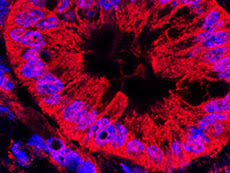
| Clinical Trials | ||
| Updates from the National Cancer Institute | ||
| Clinical Trials News | ||
 | Immunotherapy Drug with Two Targets Shows Promise against HPV-Related Cancers The investigational immunotherapy drug bintrafusp alfa (also called M7824) shrank the tumors of some patients with advanced human papillomavirus (HPV)-related cancers, according to results from a phase 1 clinical trial. | |
 | Researchers Discover Potential Way to Hit Elusive Target in Pancreatic Cancer Three research groups have found a potential way to kill cancer cells in pancreatic tumors by blocking the activity of proteins that interact with KRAS proteins while disrupting an energy-creating process called autophagy. The findings in these mouse studies have led to two clinical trials in people with pancreatic cancer, one of which is now enrolling patients. | |
| FDA Grants Selumetinib Breakthrough Designation to Treat NF1 Plexiform Neurofibromas in Kids The Food and Drug Administration granted breakthrough therapy designation for selumetinib to treat children aged 3 years or older with a rare, incurable genetic condition called neurofibromatosis type 1 (NF1)-related inoperable plexiform neurofibromas (PN). The designation, which allows for expedited development and approval, is based on phase 2 data from the multicenter SPRINT trial of selumetinib for children with NF1 and PN. | ||
 | Find NCI-Supported Clinical Trials Use our search form to find a clinical trial or other research study that may be right for you or a loved one. | |
| Clinical Trials Information for Patients and Caregivers | ||
| Phases of Clinical Trials Clinical trials to test new cancer treatments involve a series of steps, called phases. If a new treatment is successful in one phase, it will proceed to further testing in the next phase. | ||
| Randomization and Bias in Cancer Clinical Trials Randomization, in which people are assigned to groups by chance alone, helps prevent bias. Bias occurs when a trial's results are affected by human choices or other factors not related to the treatment being tested. | ||
| NCI-Supported Clinical Trials That Are Recruiting Patients | ||
| Delivering Chemotherapy Directly to Liver Metastases in Colorectal Cancer Patients In some patients with metastatic colorectal cancer, cancer spreads only to the liver. This phase 2 trial will test the effects of delivering chemotherapy directly to the liver tumors using a hepatic artery infusion pump implanted beneath the skin. Doctors want to see if delivering chemotherapy to the liver slows the growth of the metastatic tumors and increases survival time in these patients. | ||
| PARP Inhibitor Therapy for Urothelial Cancer This phase 2 trial will study how well olaparib works in treating patients with metastatic urothelial cancer and gene mutations that interfere with normal gene repair. Doctors will determine the overall response rates in patients with different types of mutations as well as assess the effects of treatment on progression-free survival. | ||
| Experimental Radiotracer for Patients with Recurrent or Metastatic Prostate Cancer This phase 1/2 trial is examining the safety and tolerability of an experimental radiotracer. The new radiotracer combines a prostate-specific membrane antigen with a radiation-emitting molecule to improve imaging of prostate cancer in patients with either biochemical recurrence or metastatic disease. Researchers will also study how the radiotracer is distributed after it is injected into the body. | ||
































No hay comentarios:
Publicar un comentario